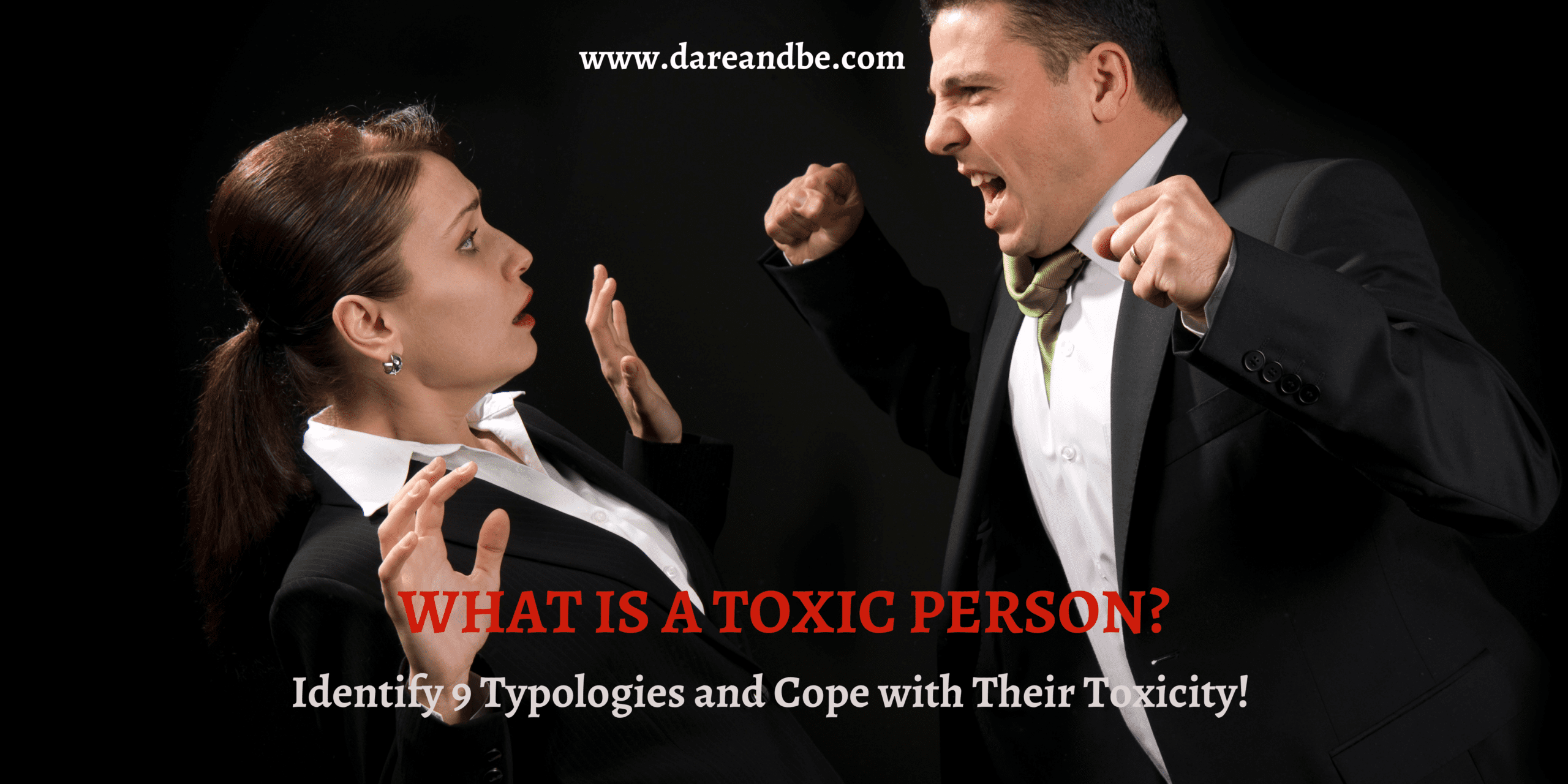WHAT IS A TOXIC PERSON? – A person who consistently exhibits negative behaviors or attitudes toward others, such as emotional and mental draining, manipulation, aggression, or criticism, to name a few, qualifies as a toxic person.
TABLE OF CONTENTS:

WHAT IS A TOXIC PERSON
Have you ever had to deal with someone who always seems to bring, in one form or another, negativity into your life?
Someone who always causes distress, confusion, and frustration?
Pushes your buttons, stretches your nerves, and drains the life out of you?
If “Yes’ is your answer, you are dealing with a toxic person.
Being around this kind of person can drain anyone’s energy and enthusiasm, hindering a positive outlook and personal goal orientation.
They are always looking for reasons to criticize and constantly find ways to put their target down and make it feel inadequate by questioning their capabilities and sanity.
The criticisms of a toxic person are never about helping their targets but rather about making them feel small and controlling how they think, feel, and act. They are done in subtle, passive-aggressive ways, making it difficult for victims to challenge them directly.
A toxic individual can be present within various social circles among family members, friends, coworkers, or acquaintances. It is essential to recognize the signs and understand their characteristics to help you identify them and take steps for protective measures.
Because when you let a toxic person make you feel miserable, they do it with your permission. In reality, it is not about their toxicity but about you and how you choose to manage every situation of conflict, anger, and interpersonal relationships.
The real key here is the personal accountability! So, stop pointing fingers at someone else and start changing your communication and approaches.
WHY TOXIC PEOPLE ARE TOXIC
Toxic behavior can stem from varied and complex psychological factors, such as unresolved childhood trauma, fragile self-esteem and self-worth, physical or verbal abuse, or mental health issues.
Some people may have undergone past trauma or abuse, using their toxicity as a defense mechanism. Their trauma can lead to a negative outlook on life and challenges for building healthy relationships.
Others may struggle with mental health issues that lead to manipulative, controlling, and harmful behavior toward others.
Toxic people have low self-esteem, and they feel insecure around others. So, they might create accusations, conflicts, or drama in situations they cannot handle to feel more powerful than those around them.
Often, their drama is directed toward other people so they do not have to deal with the emotional pain of their own lives.
Toxic people feel devoid of love but manage to convince themselves they are doing good for the world by caring for others, which is why it is no surprise when those around them begin to feel exhausted by the drama and stress they always seem to bring.
The people who are toxic in their social or personal relationships are emotionally unavailable individuals with narcissistic tendencies who typically have a history of being abused or neglected as children.
Various factors may cause these people to end up this way.
Also, consider their relationships with those close to them to understand the messages they convey and the reasons behind their behavior. In many cases, these relationships are key to their toxic tendencies.
Important to remember is that toxic behavior is not always intentional.
In many cases, some people may not realize the impact of their actions on others simply because they have lived this way for so long that it has become normal behavior.
The psychology behind toxic behavior can help you to understand the type of person you are dealing with. But that is no excuse for their harmful actions!
9 TYPOLOGIES OF TOXIC PEOPLE
There are several types of toxic people, often difficult to spot at first glance. But if you pay attention to how they speak, act, and make you feel, it can be easier to identify them and protect yourself from their negative impact to preserve your mental health and well-being.
Below are some of the most common types of toxic people, each with their characteristics:

THE MANIPULATORS
Manipulator is a term used to describe someone who seeks to control and dominate others through deceptive tactics.
These individuals are highly skilled at manipulating others to achieve their goals. They twist the truth, use guilt or fear, or play mind games to get their way.
There are different types of manipulators ranging from overtly aggressive to covertly subtle.
Some manipulators use intimidation and threats to get their way, while others rely on charm, flattery, and emotional manipulation to control others.
CHARACTERISTICS
One of the traits of manipulators is their ability to disguise their true intentions and feelings.
They may seem friendly and warm on the surface, but underneath, they are calculating and strategic in their actions, making it difficult for others to recognize their true face.
Often, the manipulators play the victim and refuse to take responsibility for their actions. They prey on those who are vulnerable, easily influenced, insecure, anxious, or lacking confidence and isolate them from friends and family.
By exploiting their weaknesses, the manipulators can gain control over the individuals and use them for their purposes.
Another common tactic is gaslighting, which involves twisting the truth and distorting reality to make the victims doubt their perceptions and beliefs.
By creating confusion and uncertainty, the manipulators can maintain their hold over the victims and continue to control them.
Using guilt, shame, and blame, they make their victims feel responsible for their mistreatment and force them to do what they want. Using the silent treatment punishes their victims for not complying with their demands.
All these characteristics create a history of unstable relationships and friendships.
COPING WITH THEIR BEHAVIOR
Being around the Manipulators may make you feel used, exploited, or defensive. So, coping with their behavior can be challenging, but there are a few steps you can take to protect yourself.
The manipulators thrive on drama and conflict, so avoid engaging in games or arguments with them, as they may use this opportunity to manipulate you further. Stay calm and rational, and do not let them push your buttons.
“I feel very anxious.”
“Makes me angry.”
“I cannot stand the situation anymore.”
All these are admissions that you have lost your power and the other person is gaining it over you. So, leash your temper, and never take toxic behavior personally.
The happier you are and less affected by their influence, the crappier they will become!
Set clear boundaries and stick to them. Let them know what behaviors are unacceptable and what consequences will be if they continue with them.
Focus on self-care. Taking care of yourself is essential when dealing with a toxic person. Practice self-care activities, such as exercise, yoga, meditation, or hobbies that bring joy and help you cope with any situation differently.
If you ever feel manipulated, seek support from people who can help you deal with your situation, and minimize your interaction with the manipulator if required.
When the situation becomes complicated, seek professional assistance from a therapist or counselor.
Also, consider cutting ties. In many cases, the best way to cope with a manipulator is to cut ties completely. It may be the best option if the toxic behavior is causing you significant stress and harm and the situation gets out of hand.
In conclusion, remember that it is not your responsibility to change them. Your priority and focus are your sanity and well-being, so do whatever it takes to protect them!
EXPLORE MORE:
Meditation Guide for Beginners – What You Should Know Before Start Meditating
Yoga Download – Take Yoga Anywhere
Disclosure: Some of the links on this website are affiliate links. I may earn a commission if you click through any of them and purchase at no additional cost. I only recommend products or services I trust and believe will add value to my readers. For more information, read the entire affiliate disclosure here.
THE NARCISSISTS
One of the most notable traits of narcissists is their inflated sense of self-importance and the intense need for admiration and attention from others. They will go to great lengths to receive them.
They believe they are extraordinary and above the rules that apply to others, expecting special treatment.
Often, they inflate accomplishments and abilities and even create fictional tales to enhance their image.
The most troubling aspect of narcissists is the lack of empathy, being unable to understand or care about the feelings of others, and often even enjoying causing them pain.
Narcissists can be charming and charismatic, but this is just a mask they wear to hide their true intentions. When their needs are not satisfied, they may get angry and hostile quickly or become emotionally distant.
Also, they may struggle with insecurity and fear of abandonment. They can be prone to extreme mood swings and become defensive when they feel threatened or criticized, creating a toxic cycle of behavior.
COPING WITH THEIR BEHAVIOR
To deal with narcissists, you must be assertive with their demands for attention or constant validation. Prioritize your own needs.
So, focus on protecting yourself and finding supportive relationships outside the toxic dynamic.
You may also want to consider seeking a therapist or counselor to help you navigate the complex dynamics of a relationship with narcissists and develop strategies for coping with their behavior.
Remember, narcissism is a complex and destructive personality trait that impacts individuals and those around them. It is unlikely that you will be able to change their behavior.
With the right tools and support, you can control how you respond to maintain a healthy relationship and prioritize your well-being.
EXPLORE MORE:
The Understanding Narcissism Summit
Disclosure: Some of the links on this website are affiliate links. I may earn a commission if you click through any of them and purchase at no additional cost. I only recommend products or services I trust and believe will add value to my readers. For more information, read the entire affiliate disclosure here.

THE DRAMATICS
They thrive on creating constant drama in their life and those around them. They tend to exaggerate the events only to get noticed and generate a sense of excitement or importance.
Often, they are seen as the center of attention and will do whatever it takes to maintain that position by creating conflict, spreading rumors, or playing a victim to gain sympathy.
This behavior can be draining and exhausting for those caught in their orbit.
One of their characteristics is a lack of self-awareness because they may not realize or even care about the impact of their behavior on others.
They can be very emotional and experience extreme highs and lows, making their moods unpredictable. They may also be prone to outbursts of anger or tears, which can be uncomfortable for those around them.
CHARACTERISTICS
Warning signs like reference include feeling caught up in their drama, drained, or exhausted after spending time with them. You may feel like you always have to walk on eggshells around them.
The Dramatic’s behavior is not a reflection of you or your actions. They are responsible for their behavior, and it is up to them to make changes to have healthy interpersonal relationships.
They need to recognize the impact of their behavior on those around them and take steps to manage their emotions constructively.
Through mindfulness and cognitive-behavioral techniques, they may benefit by developing emotional regulation skills.
Through therapy, they can learn healthier ways to communicate and seek attention.
COPING WITH THEIR BEHAVIOR
Your coping mechanisms could include remaining objective when dealing with their drama and avoiding getting caught up in their emotional roller coaster.
Another approach is to set boundaries and limit your interactions with the person. Surround yourself with positive and supportive people, and with patience and persistence, you can learn to navigate the drama and maintain your sense of peace and serenity.
THE CRITICIZERS
The Criticizers are always quick to find fault in everything you do and will never hesitate to point out your mistakes, flaws, and shortcomings.
Because they thrive on negativity, they can leave you drained, anxious, and demotivated with diminished self-esteem.
CHARACTERISTICS
One of the key characteristics of The Criticizers is their need to control. They have unrealistic expectations of themselves and others with the need to control every aspect of their life, including the people around them.
They often use sarcasm or belittling language to undermine others and make themselves feel superior. Because they have a deep sense of insecurity, they use criticism to mask their shortcomings.
Another characteristic of The Criticizers is their lack of empathy. They tend to be cold and distant and do not often consider the feelings of others. They may come across as harsh or uncaring, making it difficult to have a healthy relationship with them.
Just be aware that their criticism does not reflect your worth or value! It says more about them than it does about you. They are often irrational based on their insecurities.
They can get angry or defensive if you question their criticism because they have rigid thinking, unwilling to consider other perspectives.
COPING WITH THEIR BEHAVIOR
While it can be hard to deal with their constant negativity and criticism, below are some tips that will come in handy whenever you find yourself in their sight.
Use assertive communication. Speak up for yourself calmly and confidently, and do not allow yourself to be bullied or intimidated.
Another way to cope with The Criticizers is to set boundaries. Let it be crystal clear that their constant criticisms are not helpful and that you need space.
You do not have to tolerate their behavior or engage with them if they continue to behave in a toxic manner. It is okay to distance yourself if necessary.
Focus on the facts. When they criticize you, ignore the personal attack and focus on the specific problem pointed out.
Rely on the positive and self-care to protect your physical and emotional health. Surround yourself with people who uplift you and engage in activities that raise your vibrational state.
Focus on your strengths and accomplishments and not let their negativity get you down, no matter what they throw at you.
Seek support. Consider talking to a trusted friend or therapist who can provide emotional support and guidance to cope with the Criticizers.

THE VICTIMS
The underlying psychology behind individuals who adopt the victim role is to ignore their abilities to improve their situation.
They view themselves as powerless and dependent on others for constant validation and attention; they struggle to care for themselves and fear being alone or unsupported.
CHARACTERISTICS
Frequently express self-pity and complain about their situation and misfortunes yet refuse to change their circumstances.
They play the victim card to elicit sympathy or guilt from others, and they may use emotional blackmail to get their way.
The Victims believe the entire world is against them, and tend to amplify their problems or blame others for their difficulties.
This behavior can be frustrating for those around them, as they are not being accountable for their actions.
Another characteristic of The Victims is their negative attitude. They often focus on the negative aspects of a situation rather than looking for solutions.
This negativity can be contagious and bring down the mood of those around them.
The Victims tend to be self-centered. They may only think about their problems and not the needs or feelings of others.
This makes it hard to have a constructive conversation with them, as they may not be willing to see things from another angle.
They create a sense of blame on you for their troubles while constantly relying on you to solve them, and this behavior is not healthy or sustainable for anyone involved.
COPING WITH THEIR BEHAVIOR
If you are in a relationship with The Victims, you must set healthy boundaries and avoid enabling their behavior.
While it is natural to want to help someone in need, it is crucial to recognize when someone is taking advantage of you and assert your needs and boundaries.
The Victims may need professional help to break free from behavior patterns and develop healthier coping mechanisms.
In the meantime, prioritize your well-being and seek support from friends, family, or a therapist to develop a plan for navigating the situation.
THE GOSSIPERS
To manipulate and control, The Gossipers thrive on spreading rumors, secrets, and lies with harmful effects on individuals and relationships.
They tend to be unhappy and may resort to this behavior to fill a void in their lives and cope with their insecurities and low self-esteem.
Gossiping allows them to twist, distort, or manipulate the truth to suit their needs and agenda, which can result in misunderstandings, hurt feelings, and damaged relationships.
You can find them in the workplace or social gatherings. They may be a coworker, friend, family member, or neighbor.
CHARACTERISTICS
The Gossipers enjoy stirring up drama and creating conflict through their behavior. Because they exhibit insecurity, they spread rumors to boost their self-esteem or attract attention.
They know personal details about others they should not and love to talk negatively about them behind their back. They disregard boundaries when discussing personal matters with others or revealing confidential information.
They show a lack of empathy and fail to consider how they may affect the feelings or reputation of others.
The Gossipers try to involve you in their behavior or drama. At first, they are charming and friendly but can turn on you if you do not sustain their behavior.
COPING WITH THEIR BEHAVIOR
If today a gossiper talks about others behind their backs, tomorrow he will talk about you.
Avoid engaging in gossiping or listening to it. When dealing with gossipers, it is essential to set boundaries.
If they try to involve you in their behavior, politely tell them you are not interested in discussing other personal lives.
Send them a clear message that you do not condone their behavior, and have an honest conversation about how it affects you and others.
Prioritize healthy and positive relationships to cultivate a happier social environment. Surround yourself with people who uplift you rather than those who love gossiping and dragging you and others down.

THE NEGATIVISTS
The Negativists consistently exhibit a negative attitude toward life and those around them. Such individuals may have a pessimistic outlook and frequently complain, blame, and criticize others.
CHARACTERISTICS
One of the characteristics of The Negativists is their tendency to complain about everything. For them, any situation, change, or approach appears under the sign of negativity.
This negative attitude can be draining for those around them and can bring down the mood of an entire group.
Negativists tend to avoid responsibility and blame others for their problems, creating a toxic environment where everyone is constantly on the defense.
COPING WITH THEIR BEHAVIOR
If you want to deal with The Negativists, it can be helpful to comprehend the root of their behavior. They may have encountered demanding life events or underlying mental health concerns that led to their negative attitude.
In this case, you could interact with them more empathetically and compassionately by grasping their outlook.
Another approach is to set clear boundaries around what you will and do not tolerate. If their negativity brings you down, limit your interactions and control how much time and energy you devote to them.
Practice self-care when you deal with this kind of individual. Their negative attitude can be draining, so take care of yourself physically and emotionally by getting enough sleep, eating well, and engaging in positive activities.
THE GASLIGHTERS
Gaslighting is a form of emotional abuse that can cause significant lasting effects on the victim’s mental health.
The Gaslighters manipulate the victim’s perception of reality by denying or distorting the truth, leading the victim to doubt their judgment and memory. They may develop anxiety, depression, or struggle with self-doubt.
CHARACTERISTICS
The Gaslighters use different tactics, and lying frequently and convincingly is one of them.
They twist the truth to suit their needs and desires and deny their sayings, behaviors, and actions, even when the victim has clear evidence.
In this case, they may accuse their victim of being overly sensitive or irrational.
The Gaslighters use isolation as a tool to control their victims. They may try to cut their victim off from friends and family, making it harder for them to seek help or support from outside sources.
They may use intimidation, threats, or even physical violence to keep their victims in line or love bombing, showering their victim with affection and attention to create a sense of dependency.
Often, they shift the blame onto others for their mistakes and shortcomings and use vague or confusing language to avoid accountability.
COPING WITH THEIR BEHAVIOR
Trust your instincts. When you feel something is not alright, it is because it is not.
Gaslighters are skilled at manipulating their victims and breaking free from their influence on your own can be difficult.
If you suspect you are a victim of gaslighting, seek help from a trusted source to provide a healthy perspective and validation.
Always record their behavior. Documenting their lies and inconsistencies can help you stay grounded in reality. Do not let them make you doubt it.
Gaslighting can be draining and anxiety-inducing, so practice self-care and prioritize your well-being. Sometimes, ending the relationship may be necessary for your mental health and safety.

THE BACKSTABBERS
A backstabber is a deceitful person who appears loyal and trustworthy but spreads rumors, lies, and disinformation behind your back to harm your reputation and relationships.
CHARACTERISTICS
One of the main characteristics of backstabbers is duplicity. The Backstabbers are highly skilled at appearing trustworthy and friendly but lack authenticity and sincerity.
They often use flattery and compliments to gain your trust and confidence. But, after they use their knowledge against you to manipulate and control your behavior or to sabotage your success.
Another characteristic of backstabbers is their tendency to gossip and spread rumors.
They often use their social networks to create chaos and confusion, and their power and influence to turn others against or damage your reputation in subtle and insidious ways.
COPING WITH THEIR BEHAVIOR
To cope with backstabbers, you must confront them directly and assertively without becoming aggressive or emotional. You can calmly explain how their behavior affects you and ask them to stop.
You can also set clear boundaries and expectations for how you want to be treated and hold them accountable for their actions.
Additionally, it can be helpful to practice self-care and stress management techniques, such as meditation, exercise, and therapy.
These strategies can help you stay calm and centered in the face of their behavior and help you build resilience and strength for future challenges.
You may need to distance yourself from the person. Develop the support of friends and family who can provide emotional and practical help to build a positive environment for yourself.
FINAL THOUGHTS TO TAKE AWAY…
Think about any person in your life and answer these three questions:
- What kind of effect does this person have on you?
- How would you describe this person in a few words?
- Do you like who you are around this person?
After reading this article, I hope you know how to identify toxic people, understand their motives and intentions, and deal with them calmly and assertively. Don’t let their toxicity hold you back – use the strategies and learn techniques to stand up for yourself effectively. You now have the power to make choices and take action.
But if you decide to spend less time with toxic people or cut them out completely, it is all right without feeling guilty. If this is the last resort to keep your sanity and well-being intact, do it without remorse.
EXPLORE MORE:
7 Practical Techniques for Dealing with Toxic People
Till next time…
When someone offers you their toxicity as a gift, refuse the gift!
Founder of Dare&Be.
Contact: support@dareandbe.com

My daughter came up to me the other day after school and said “Dad my friend is so Toxic!”
I thought it was the funniest thing ever because she is 12 years old and I highly doubt she even knows the meaning of Toxic. But nonetheless, this is an awesome article and it really gets into the deep meaning of the word and all the types of toxic personalities, Thanks this helped me a lot.
Hi Keith,
That’s absolutely adorable! It’s amusing how kids can sometimes pick up the latest vocabulary without fully understanding the meaning behind it. While it may vary from child to child, in general, a 12-year-old child may have some understanding of the concept of a toxic person. Children at that age are becoming more socially aware and may have encountered individuals who exhibit negative behaviors or traits. However, their understanding of the terms “toxic” or “toxic person” may not be comprehensive as that of adults.
That is why it’s important for parents to provide age-appropriate explanations and discussions about toxic behaviors, emphasizing the impact they can have on relationships and well-being. This can help children develop a basic understanding and awareness of toxic dynamics.
Keith, thank you very much for stopping by and best wishes to you and your daughter!
Diana,
I noticed one common thread from your article on ‘The Toxic Person’, they are all negative. Each of them in their own way thrives on negativity. It is sad to believe so many people have such a negative outlook on life. Each person needs to know the signs of that toxic individual and how to cope with them. Unfortunately, we are not normally taught these tools when we are growing up. This is a skill that takes time to develop and maintain.
The toxic person needs and should be encouraged to seek professional help for their behavior. With time, positive behavior can become their focal point with a better life ahead of them.
Jerry
I think we all know or have that one toxic person in our lives. It is all very well to say stay away, but what if it is a family member whom you can’t always avoid? Sometimes people have to live with these family members and have no way of escaping the relationship.
Thanks for helping your readers to identify the type of toxic people and what to look for and be wary of. I think the worst type of toxic person is the narcissist. I know a few of these and I really do everything I can to avoid spending too much time with them.
Although it can be challenging to separate ourselves from toxic people, especially if they are close friends, we must ultimately put our own well-being first. Your recommendations for coping with toxic individuals were quite useful. This is a fantastic read that is unquestionably educational. It does not point the finger at the reader, but rather allows them to empathize with or comprehend the viewpoint. Thank you for your efforts! Excellent work!
Hi Pasindu,
Thank you for your positive feedback. I am glad you found the coping recommendations helpful and that the article provided educational value. Indeed, my article has an empathetic and non-judgmental approach, and I hope the practical tools I provided will help you navigate different toxic situations in the future.
Once again, thank you for reading the article and for your support.
You’ve really given some great descriptions of the various types of toxic people and their characteristics. I have definitely worked with my share of toxic people, and it makes for a very bad work environment. My last workplace was an office setting with all women. There was a lot of gossiping and backstabbing going on, I hated it and ended up quitting. It’s such a shame when toxic people make the job bad, in my situation, the job itself was great, just not the people! I think this happens to a lot of people, and it’s really hard to avoid.
Hi Jenny,
Thank you for your feedback. I’m sorry that you had to experience a toxic work environment, and I can understand how it can make a job that was otherwise great into a difficult and unpleasant experience. Workplace toxicity can be challenging to avoid entirely, especially if it is a widespread issue within the company. But it is always worth considering whether there are any steps you can take to address the situation by speaking with a manager or HR representative.
Remember that you have control over how you react to toxic people and their behavior. If the situation is not improving or becomes unbearable, sometimes the best course of action is to find a healthier work environment that aligns with your values and provides the support and respect you deserve.
That is exactly what you did in your case and I hope that you found stability and a healthier and more pleasant work environment at your new job.
It can be difficult to distance ourselves from toxic people, especially if they’re family members or close friends, but ultimately we need to prioritize our own well-being. Your suggestions for dealing with toxic people were very helpful, particularly the idea of limiting contact and focusing on positive relationships. Thank you for such amazing article, i’m really enjoy reading
Hi Maxon,
Thank you for stopping by. I’m glad to hear that my suggestions were helpful to you. Indeed, it can be very hard to distance ourselves from toxic people when they are family members or close friends. However, prioritizing our own well-being is crucial for our mental health and overall happiness.
Setting boundaries and limiting contact with toxic people is a necessary step in maintaining our well-being. Important is to surround ourselves with positive relationships that uplift and support us, rather than bring us down. This does not mean we have to cut toxic people out of our lives completely, but we can choose to spend less time with them or interact with them in a way that minimizes their negative impact on our mental and emotional health. Taking steps to protect our well-being and prioritize positive relationships is a powerful way to promote our happiness and success.
Wow! Your article is very explicit about toxic people. But I get from your article is that toxic people are deeply imbalanced and that they need to undergo therapy. That would help. During my life, I’ve encountered manipulators, narcissists, and also backstabbers. Backstabbers are the worst in my opinion because they smile at you but they destroy you behind your back.
Hello Angel,
I am convinced that each of us faces a toxic individual at some point in our lives. Whether we have it among family members, colleagues, or friends. How we manage their presence in our life, and how we respond to their actions and words, depends strictly on us.
And to complete the statement about therapy as a suggestion, I must tell that toxic people can exhibit patterns of behavior that are harmful to themselves and those around them. They may benefit from therapy to address underlying issues that contribute to their toxic behavior. However, important is to remember that not all toxic people are willing to seek help or acknowledge that they have a problem.
Through therapy, they gain insight into their thoughts, feelings, and behavior and develop healthy coping mechanisms. But, seeking therapy is a personal decision that must be made by the individual. It is not always easy to get someone to seek help, especially if they don’t recognize the impact of their behavior on others.
With my answer, I hope I clarified that statement. Thank you very much for your appreciation and feedback, and you are more than welcome to come back for new updates.
Great page and article! It definitely poses you for some self-reflection. I have to say that I have had all of these types of personalities in my life. Through my 49 years on this great planet, I have been lucky or unlucky, depending on your view, to deal with or be subjected to them at length! It is a great read and definitely very informative. It really doesn’t point the finger at the reader but gives them a chance to identify with or understand the perspective. Thanks for the hard work! Great job! Keep writing you do it well!
Hello there,
Thank you so much for your kind words and feedback! I’m glad that you found the article informative and an opportunity for self-reflection because, at some point, we can all find ourselves in some specific characteristic of a toxic person. Maybe we are not aware of it, or maybe we just prefer to deny it.
As you mentioned, the article is not meant to point fingers at anyone, but rather to provide insight and understanding. Remember that we all have our struggles and challenges and that toxic behavior can stem from a variety of factors.
Thank you again for taking the time to read and provide feedback. I truly appreciate it! If you have any further thoughts or questions, don’t hesitate to reach out.